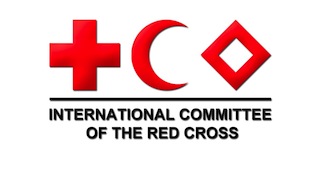International Red Cross mounts major air lift to Sudan’ Darfur region
By ED JOHNSON, Associated Press Writer
AL-FASHER, Sudan, Aug 24, 2004 (AP) — The international Red Cross said Tuesday it was launching a major airlift of relief supplies to Sudan, its largest operation of the kind since the war in Iraq.
 Sudan’s interior minister, meanwhile, said a cease-fire with rebel factions in Darfur was violated twice on the opening day of peace talks that aim to bring an end to the crisis.
Sudan’s interior minister, meanwhile, said a cease-fire with rebel factions in Darfur was violated twice on the opening day of peace talks that aim to bring an end to the crisis.
The United Nations terms Darfur the world’s worst humanitarian crisis. More than 30,000 people have been killed and 1.4 million forced to flee their homes in the 18 months of fighting between African rebel groups and Arab militia known as the Janjaweed.
Interior Minister Abdel-Rahim Hussein said Monday’s attacks by Sudanese Liberation Army fighters, which left several police injured, did not bode well for peace talks in Abuja, Nigeria, which opened the same day. But he insisted the government remains committed to the peace process.
“It still means we continue the talks because we think the only way to reach a solution is through negotiation,” he told The Associated Press after visiting the scene of one attack – a police post responsible for security at Zam Zam refugee camp, 10 miles south of the regional capital, Al-Fasher.
He said the second attack was on a police car near Tawilah, 35 miles west of Al-Fasher.
It was not possible to independently confirm the attacks or the affiliations of the perpetrators. But at Al-Fasher’s military air base, two men wearing blue police uniforms, suffering apparent leg injuries, lay on stretchers in a room pockmarked with bullet holes from a rebel attack last year.
Announcing plans to launch a major airlift to the region, the Red Cross said it was planning six trips carrying trucks, other equipment and medical supplies by Sept. 5.
“The aim is to improve ICRC access to thousands of people still deprived of urgently needed humanitarian aid and to provide further supplies to meet vital health and water needs,” the agency said.
The peace talks in Nigeria are a last-minute attempt for progress before Monday’s U.N. Security Council deadline for Khartoum to disarm the Arab militia accused of terrorizing African farmers or face economic and diplomatic sanctions.
Earlier Tuesday, British Foreign Secretary Jack Straw toured a sprawling desert camp housing 40,000 displaced people and urged the Sudanese government to do more to make it safe for the frightened refugees to return home.
Straw, whose country has veto power on the Security Council, said officials should be in a position by week’s end to decide whether Khartoum had made sufficient progress in easing the crisis to avoid sanctions.
He said there had been progress since the Security Council set the deadline, noting that humanitarian aid groups had been granted access to the western region and that security in the camps had improved.
But “people are still very anxious, apprehensive and nervous about whether they will be safe to go back to the villages from which they have come,” Straw said. “There is still a lack of confidence that it is safe for them to return home, and that has got to be pinned down.”
Straw spent about 90 minutes in the sprawling camp dotted with makeshift straw and tarpaulin shelters. Children ran excitedly around as he spoke with aid agency officials.
Babies in a medical tent, with tubes inserted in their noses, cried in their mother’s arms as he toured a medical facility.
Aid agency representatives said the security presence at the camp was significant Tuesday, unlike typical days without visiting dignitaries. Blue-uniformed police clutching rifles were visible at regular intervals in the camp, one of 147 in Darfur, a western region the size of France.
Although well organized with water points, latrines and some medical facilities, aid workers say the camp has one of the highest malnutrition rates in the Darfur region. They also report that some Sudanese police responsible for protecting the refugees are sexually exploiting women in the camps.
Later, on his return to Khartoum, Straw met with President Omar el-Bashir, and then briefed reporters.
He said he urged el-Bashir to help Britain and the international community assist Sudan by implementing the Security Council resolutions, which it willfully endorsed.
Straw said the United Kingdom and the international community realized that Sudan’s government could not be held solely responsible for the atrocities and insecurity in Darfur, but it was the government’s responsibility to restore security.
“There is always a heavier responsibility on the government,” he said.
Sudan, which has long denied backing a scorched-earth policy by the Janjaweed to crush the revolt, insists it is working with the international community to ease the crisis and is moving to rein in the Arab militia.
